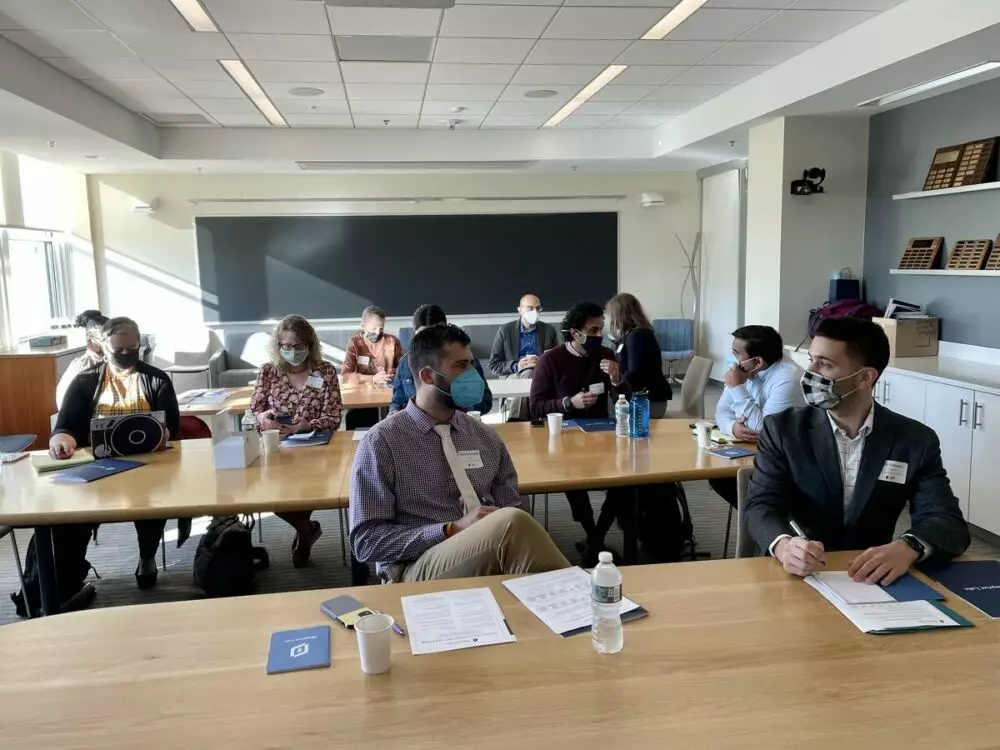On behalf of MIT Blueprint Labs, we want to extend a heartfelt thank you for your support this year. 2021 was an exciting year at Blueprint as we investigated the most pressing issues in education, health care, and the workforce. We look forward to continuing this important work in the new year.
This fall, Blueprint Labs Director Josh Angrist received the 2021 Nobel Memorial Prize in Economic Sciences. Josh and Guido Imbens received the award for their “methodological contributions to the analysis of causal relationships.”
Prior to the excitement of the Nobel, we formally relaunched as Blueprint Labs. Over the past decade, our team grew from a few people to a thriving lab of over 40 faculty, staff, and student affiliates. Alongside our robust education work, Blueprint Labs also pursues high-impact health care and workforce projects.
In 2021, our faculty and affiliates released 21 groundbreaking research papers on education, health care, and the workforce. You can find a few highlights below.
School quality measures have far-reaching impacts, influencing school restructuring decisions, home prices, parents’ school decisions, and more. This year, Blueprint researchers released a working paper on school quality measures, forthcoming in the Review of Economics and Statistics. Check out the study’s website to see how their new approach improves upon conventional measures.
In the midst of a nationwide debate on universal preschool, Blueprint researchers released new findings on the long-term effects of universal preschool in Boston. They found that preschool enrollment boosts college attendance, high school graduation, and SAT test-taking. Finally, we are thrilled to share that our experiment on the impacts of scholarships on post-secondary outcomes was recently published in the Quarterly Journal of Economics.
When COVID-19 vaccine distribution began, many questions emerged about whether and how to prioritize different groups of people. This working paper describes how these trade-offs depend on mitigation measures. State governments around the country used these findings to inform their vaccine roll-outs.
Building on their previous influential paper on the impact of China’s emergence as an economic power, Blueprint researchers released a follow-up working paper this year. They found that in US manufacturing communities hardest hit by China’s exports, most people who lost their jobs didn’t move to seek new employment. Government policies haven’t helped enough, and these areas are getting poorer.
Throughout the year, we held outreach events to convene practitioners, policy makers, and researchers.
In February, Blueprint held its annual school summit, focused on “COVID-19 Challenges and Opportunities in K-12 Education.” In March, we held a two-day, virtual interdisciplinary workshop on organ allocation. In October, we kicked off the second cohort of the School Access and Quality Fellowship, welcoming education leaders focused on enrollment reform from around the country. You can read more about these events and others below.
Thank you for your continued engagement with Blueprint’s work. As we continue to grow, we are more motivated than ever to fulfill our mission of uncovering the consequences of policy decisions and improving society.
| Josh Angrist Director, Blueprint Labs Professor of Economics, MIT |
Parag Pathak Director, Blueprint Labs Professor of Economics, MIT |
| Nikhil Agarwal Co-Director, Blueprint Labs Professor of Economics, MIT |
David Autor Co-Director, Blueprint Labs Professor of Economics, MIT |
Agarwal, Nikhil, Itai Ashlagi, Michael Rees, Paulo Somaini, and Daniel Waldinger. “Equilibrium Allocations under Alternative Waitlist Designs: Evidence from Deceased Donor Kidneys.” Econometrica, 89 (2021): 37-76.
Angrist, Joshua, David Autor, and Amanda Pallais. “Marginal Effects of Merit Aid for Low-Income Students.” Quarterly Journal of Economics (2021).
Angrist, Joshua, Sydnee Caldwell, and Jonathan V. Hall. “Uber versus Taxi: A Driver’s Eye View.” American Economic Journal: Applied Economics, 13 (2021): 1-37.
Avery, Christopher and Parag Pathak. “The Distributional Consequences of Public School Choice.” American Economic Review, 111 (2021): 129-152.
Cohodes, Sarah, Elizabeth Setren, and Christopher Walters. “Can Successful Schools Replicate? Scaling Up Boston’s Charter School Sector.” American Economic Journal: Economic Policy, 13 (2021): 138-167.
Cohodes, Sarah and Katharine Parham. “Charter Schools’ Effectiveness, Mechanisms, and Competitive Influence.” Oxford Research Encyclopedia of Economics and Finance (2021).
Ellison, Glenn and Parag Pathak. “The Efficiency of Race-Neutral Alternatives to Race-Based Affirmative Action: Evidence from Chicago’s Exam Schools.” American Economic Review, 111 (2021): 943-975.
The COVID-19 pandemic continues to present policymakers and clinicians with difficult ethical questions regarding who should first receive scarce supplies, vaccines, and life-sustaining treatments. Over a series of articles published in Chest, Pathak and co-authors consider different allocation strategies and propose the use of a “categorized priority system” (also known as a reserve system). This type of system allows greater flexibility to balance multiple ethical principles. They examine this system for allocation of COVID-19 monoclonal antibodies and other scarce medical resources.
Agarwal, Nikhil, Andrew Komo, Chetan Patel, Parag Pathak, M. Utku Ünver. “The Trade-off Between Prioritization and Vaccination Speed Depends on Mitigation Measures.” NBER Working Paper #28519.
Angrist, Joshua, Peter Hull, Parag A. Pathak, and Christopher R. Walters. “Credible School Value-Added with Undersubscribed School Lotteries.” Blueprint Discussion Paper #2021.10.
Autor, David, David Dorn, and Gordon H. Hanson. “On the Persistence of the China Shock.” Blueprint Discussion Paper #2021.11.
Campos, Christopher, and Caitlin Kearns. “The Impacts of Neighborhood School Choice: Evidence from Los Angeles’ Zones of Choice.” Blueprint Discussion Paper #2021.16.
Cohodes, Sarah and James Feigenbaum. “Why Does Education Increase Voting? Evidence from Boston’s Charter Schools.” Blueprint Discussion Paper #2021.09.
Greenberg, Kyle, Parag Pathak, and Tayfun Sönmez. “Mechanism Design Meets Priority Design: Redesigning the US Army’s Branching Process.” Blueprint Discussion Paper #2021.08.
Gray-Lobe, Guthrie, Parag Pathak, and Christopher Walters. “The Long-Term Effects of Universal Preschool in Boston.” Blueprint Discussion Paper #2021.05.
Halloran, Clare, Rebecca Jack, James Okun, and Emily Oster. “Pandemic Schooling Mode and Student Test Scores: Evidence from US States.” Blueprint Discussion Paper #2021.14.
Kline, Patrick, Evan Rose, and Christopher Walters. “Systemic Discrimination Among Large U.S. Employers.” Blueprint Discussion Paper #2021.07.
Mountjoy, Jack. “Community Colleges and Upward Mobility.” Revised & resubmitted, American Economic Review.
Pathak, Parag, Tayfun Sönmez, M. Utku Unve, and M. Bumin Yenmez. “Fair Allocation of Vaccines, Ventilators and Antiviral Treatments: Leaving No Ethical Value Behind in Health Care Rationing.” In Proceedings of the 22nd ACM Conference on Economics and Computation.
Pathak, Parag, Kevin Ren, and Camille Terrier. “From Immediate Acceptance to Deferred Acceptance: Effects on School Admissions and Achievement in England.” Blueprint Discussion Paper #2021.15.

Josh Angrist pictured with his Nobel medal. © Nobel Prize Outreach. Photo: Risdon Photography
Over the past few months, we’ve celebrated and honored Josh Angrist’s Nobel Prize in Economics. On Blueprint’s website, you can watch the recordings from Nobel Week 2021, including Josh’s Nobel lecture, and follow the latest news about the prize. Two of Josh’s former students wrote about his impact on economics and teaching (read the articles from Columbia professor Sarah Cohodes and Brown professor Peter Hull).
Blueprint Co-Director David Autor received a 2021 Society for Progress Medal for “his path-breaking research underscoring the core contemporary issue of labor adjustment in response to developments in trade and technology.” These medals are awarded to individuals who inspire actors to “better integrate economic performance with fairness, well-being, and nature.”
Blueprint Affiliate Daron Acemoglu joined the American Academy of Arts and Science’s Commission on Reimagining our Economy, a group formed to assess the last 50 years of economic policymaking and make recommendations to create an economy that best serves the needs of all people.
Throughout the year, Blueprint Labs held regular events with policy audiences, designed to translate high-quality research into practice. These convenings provided a unique space for education, health care, and workforce leaders to integrate the latest research into policy making.
COVID-19 Challenges and Opportunities in K-12 Education
February 11-12, 2021
The COVID-19 pandemic continues to impact students, teachers, administrators, and parents across the country. Last February, Blueprint Labs convened education researchers, practitioners, and government officials to discuss the varying responses and evidence around learning during the pandemic. Notable keynotes included Rhode Island Governor Gina Raimondo and Education Commissioner Angelica Infante-Green.
Challenges and Opportunities in Organ Allocation
March 5-6, 2021
Blueprint Labs held a two-day, virtual interdisciplinary workshop on organ allocation, in collaboration with Stanford University. Leading economic and medical researchers, policymakers, and transplantation professionals came together to learn about the current challenges faced by the allocation system and how to alleviate them. Attendees also discussed recent academic research and novel approaches for addressing these problems.

Blueprint Labs Launch
July 30, 2021
The MIT School Effectiveness and Inequality Initiative (SEII) began in 2011. The public launch of Blueprint Labs featured background on how the organization has changed, as well as research spotlights from Blueprint’s faculty directors. Josh Angrist presented on the effects of merit aid for low-income students, Parag Pathak discussed the long-term effects of universal preschool, and Nikhil Agarwal shared his research on market failure in kidney exchange.
School Access and Quality Fellowship
October 8, 2021
Blueprint launched the second cohort of the School Access and Quality Fellowship with full-day kickoff. The one-year fellowship is designed for education leaders currently researching, implementing, or expanding enrollment reform. The 21 fellows in this cohort represent school districts, nonprofits, state agencies, and charter organizations from across the country. At the kickoff, fellows participated in sessions on equity, declining enrollment, common application reforms, neighborhood school choice programs, and more. Over the course of the year, fellows will study cutting-edge research, form a national network of peers, and reflect on their practices together.
We look forward to sharing findings from several exciting studies, as well as our expanding initiatives to further engage policymakers and practitioners.
School quality measures have far-reaching impacts, influencing school restructuring decisions, home prices, parents’ school decisions, and more. Early this year, Blueprint researchers will release a working paper that investigates school quality ratings. They look into these ratings’ correlations with a school’s demographic characteristics and a school’s quality.
Subscribe for Updates